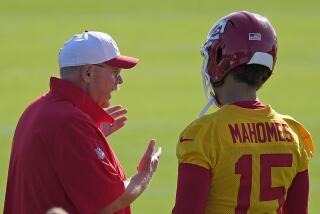Collective Bargaining in NFL Is Called Extinct
- Share via
Pro football will resume without a collective bargaining agreement when training camps open in July, representatives of the players said Tuesday.
It will be the NFL’s fourth year without such an agreement, and, they said, it is unlikely that there will ever be one again.
“Individual bargaining is the wave of the future in major league sports--as baseball and basketball have proved,” Tom De Paso, an NFL Players Assn. attorney, said from Washington.
Former wide receiver Randy Vataha, now a sports agent with Bob Woolf’s agency in Boston, predicted that there will be no new agreement for at least the duration of Green Bay quarterback Don Majkowski’s pending suit against the league.
“The (Eighth Circuit) Court decision in the Powell case last fall put the players’ union out of business,” Vataha said. “The court held that, regardless of whether there’s a player-owner bargaining agreement, the league’s antitrust labor exemption will last as long as there’s a union. That gave the NFLPA no choice but to decertify.”
It decertified last November. But it did not quit. Seemingly as strong as ever, the NFLPA is now doing business as a union that is not a union--representing the players as a professional association.
In the landmark Powell case, which is now before the U.S. Supreme Court, various judges have ruled both for and against the NFL’s club owners since October of 1987. That is when former player Marvin Powell sued the NFL, alleging flagrant antitrust violations in matters ranging from the player draft to the right of free agency.
Majkowski, in association with Freeman McNeil of the New York Jets and six other players, is also seeking free agency in a suit filed last month in federal court in Newark, N.J.
“I think all the players who have heard my cause are glad I’m doing this,” said Majkowski, who attained stardom last fall.
“I’m trying to change something that I believe is wrong.”
The difference between the Powell and Majkowski cases is that the NFL has been tying Powell to an agreement made by a union.
“In the (Majkowski) case, the (NFLPA) is no longer a bargaining agent,” Majkowski’s lawyer, James Quinn, said from New York, adding that the NFL has thereby lost its antitrust shield. Quinn will first oppose the NFL in a hearing June 11 at Newark.
There has been speculation throughout the league that the NFLPA’s executive director, Gene Upshaw, has pledged not to participate in collective bargaining discussions with any league representative until the courts have ruled on Majkowski’s status.
“I couldn’t participate if I wanted to,” Upshaw said. “We aren’t a union anymore. We aren’t a bargaining agent.”
Could that change?
Said Quinn: “I’ve seen the NFLPA’s new bylaws. They flatly prohibit the association from participating in collective bargaining.”
In Vataha’s view, the courts have already carried the NFLPA to a point of no return.
“The Powell decision is much more powerful than most people realize,” he said. “What it means is that the players are free as long as they don’t have a union.
“If they turn around now and sign a new collective agreement--even if it’s a good one--they’ll be a union again, and they’ll have lost what they’ve gained.”
Many NFL owners are still pressing for the collective agreement they need to extend the draft beyond 1992--they will discuss it again at a Dallas meeting next week--but as a group, they remain divided.
The players are not united, either, although most have been disappointed by the results of past collective agreements.
More to Read
Go beyond the scoreboard
Get the latest on L.A.'s teams in the daily Sports Report newsletter.
You may occasionally receive promotional content from the Los Angeles Times.










